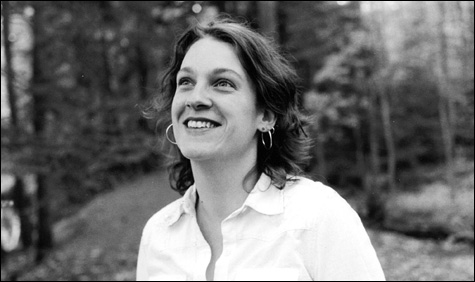
HAPPY IN THE YARD: Sara Cox alone, for a moment. |
Women may dominate the pop charts from time to time, but in the annals of acknowledged rock/pop greatness, they are few in number. The latest Mojo, a music magazine that remains one of the many pleasures of travel to the UK, asked a panel of musicians to develop a list of the 100 records that changed the world. Here are the women who made the list: Donna Summer, Nina Simone, Pixies bassist Kim Deal, Carole King, Joni Mitchell, Billie Holiday, the Ronettes, Patti Smith, and Aretha Franklin. That’s 11 women, on a list that comprises 250 or more musicians who’ve gone about changing the world.
So Iron Maiden make the cut, but not Madonna’s Vogue? Dookie, but nothing from Janis Joplin? What about Dolly Parton’s “9 to 5”? That song didn’t change the world? Or June Carter? She carried AP’s ass, that’s for sure.
As with the corporate world, there exists in contemporary music a glass ceiling of sorts, where women can be celebrities, like Paris Hilton or Britney Spears or Lindsay Lohan (does she sing? I can’t remember), but very rarely can be taken seriously as songwriters and musicians. I don’t think it’s a stretch to say both ceilings are propped up by a woman’s duty to or desire for family life.
And it’s not just women. That same Mojo gave the new (superb) Wilco disc a paltry three stars (Holly Golightly and the Brokeoffs garner four, natch) and as part of the criticism chides Jeff Tweedy’s heart-rending breakup song “Hate it Here” for being “downright maudlin with its mundane chore list ... as if he’s the frustrated fraulein in Glen Campbell’s Dreams of the Everyday Housewife.” Pitchfork’s review of Sky Blue Sky used “domestic” as a slur.
Music critics, apparently, don’t have to mow the lawn or change the sheets or do the laundry. They’re too cool for that.
Sara Cox isn’t. Like the Dixie Chicks and countless other female recording artists before her, Cox took a bit of a break from being a professional musician (it’s been almost four years since Arrive; I remember because it came out the week I had my first child) to have another kid and she has returned with a very domestic record, indeed, full of grappling with mundanity and reveling in the sweet pleasures of family life.
Her wry sense of humor is intact — “Well the oldest one asks what I do for a livin’/I suppose I’m just living here” — added to a newly honed appreciation for what she has: “The truth of it all is it’s better than it ever seemed.” People like to complain about having kids and such, but that’s mostly making conversation. In the end, Cox seems to have decided, this family stuff is not so bad, really.